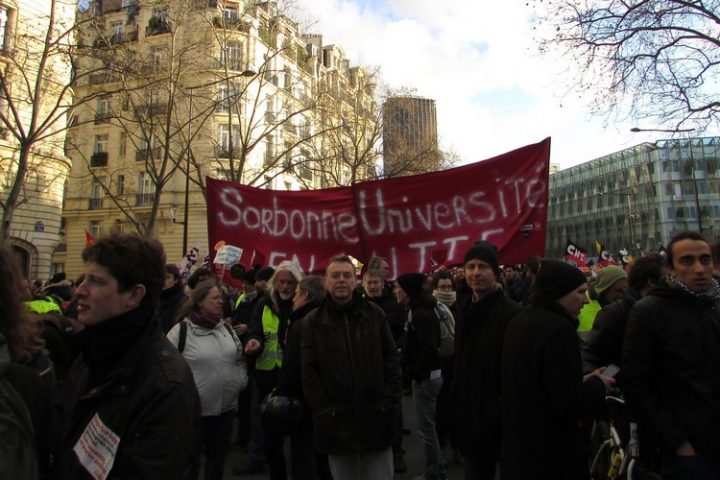“We need an ambitious, unequal law – yes, unequal, a virtuous and Darwinian law, which encourages the world’s best scientists, teams, laboratories and establishments, a law that harnesses efforts.” These were the controversial words of Antoine Petit, mathematician and director of the CNRS, on November 26, 2019, on the occasion of the centre’s 80th anniversary. (Les Echos)
Since then, this mathematician has caused huge discontent among the scientific community. Many claim that this openly hierarchical and unequal idea is a sign of the future Loi de programmation pluriannuelle de la recherche (LPPR), due to be implemented at the beginning of next year.
The need to renew the scientific field in the face of a period of instability
The objective of the LPPR law is simple although it is quite difficult to achieve: investment in research and tertiary education in order to develop France’s scientific field on an international scale.
There is no question that the quality of education and scientific research (natural, exact and social sciences) in France has declined sharply in recent years. According to the founders of the bill, between 2012 and 2018, public scientific and technical establishments lost 3,650 jobs, while the number enrollments is constantly increasing. On the other hand, the hiring rate of new university lecturers has decreased by 40%. Every day, more and more part-time lecturers are being hired. (Ministry of Advanced Education)
The vulnerability of lecturers is obvious: they teach classes of 50 students, do not earn enough and are forced to carry out their research with very limited budgets. And on top of this, there is the precarious state of the faculties and the issue of administrative deficiency.
In March 2000, the European Council adopted a European Union policy entitled “The Lisbon Strategy”. Its objective was to allocate 1% of annual GDP to public research and innovation. Yet today, only 0.8% of French GDP is devoted to this. (Le Monde)
In this situation of scientific and academic deficiency, it comes as no surprise that the government wants to introduce a reform, especially if its objective is to avoid being overshadowed by other highly innovative nations, such as China, Germany or the United States.
Nevertheless, many universities and institutes fear that this ambition will be achieved at the expense of the most precarious workers. (Let’s save the universities)
The government’s project: scientific progress or Social Darwinism?
According to the Ministry of Higher Education, Research and Innovation, the bill, which is currently being prepared, is led by three groups of researchers and scientists: the first is related to funding, another to the attractiveness of scientific jobs and careers, and the last to innovation and partnership research. Each group has submitted its proposals. They evoke the importance of doing research and the need to keep up to date with everything that goes on in the field, without neglecting the fields that tend to suffer the most: human sciences. However, for some of the researchers, these proposals are clearly lacking.
On the one hand, the LPPR intends to fund research on a project-by-project basis. This means that research professors (lecturers) will have to go through an “assessment agency”. The problem, according to Antoine Gaudin, lecturer at the University of Sorbonne Nouvelle Paris 3, is that this will further reduce the number of funded projects, and will increase the precariousness of young researchers, because it is precisely carrying out research that enables them to become tenured and thus find a permanent contract. Moreover, according to him, funding will depend on the criteria of the “agents”. Indeed, the most emerging projects might not be accepted, if these “agents” are researchers who are fairly advanced in their careers. On the other hand, they are unlikely to choose projects that are too “destabilizing”, unpredictable or, in simpler terms, that do not contribute to improving the country’s economy or even politics. (Nina Soussan)
On the other hand, the law intends to abolish the number of hours lecturers have to work (192h), and will instead promote fixed-term contracts. This will imply no overtime and thus avoid the cost of paying it. However, fixed-term contracts increases the risk of instability for young researchers, and may thus create a climate of strong competitiveness. This disputed method, known as tenure-track, is used in the United States. It consists formulating different types of contracts, based on the age and experience of the researcher, in order to better control, or even slow down, the progress of young lecturers/researchers. Thus, they will have to wait another ten years to obtain their tenure-track tenure (45 years instead of 35, on average). (Université Ouverte)
However, the LPPR provides for the use of fixed-term contracts in private companies, the conversion of doctorates into diplomas of employability, and the development of a system of performance-based rewards. (Université Ouverte)
Admittedly, a merger or semi-merger with the private sector could lead to better working conditions for some and require a smaller budget, but it will put an end to the autonomy of researchers, not to mention a highly probable hierarchisation, as well as an increase in the precariousness of the less fortunate. This is undoubtedly a controversial issue: the Ministry of Higher Education, Research and Innovation is only trying to apply measures (tenure-track, performance) already used in other countries. However, even in the most liberal countries, they are constantly questioned. (Chronicle, Enago)
The reaction of the scientific community: motions, strike and mobilization
Shortly after Antoine Petit’s comment, on December 12, 2019, senior members of the CNRS wrote an open letter against their CEO: “An ‘unequal law’ will only reinforce the current fragilities of French public research (…). The national committee cannot be associated with the implementation of a ‘Darwinian’ (sic) policy in tertiary education and research in France”.
A group of researchers, including François Massol, an expert in ecology and member of the CNRS, also produced a petition, signed by 37 intellectual and academic associations. “There is a complete consensus within the CNRS – except from the CEO,” Massol said, regarding the opposition. (Times Higher Education). The petition condemns Petit’s competitive penchant, as well as the future LPPR, and was signed by 14,769 people (as of January 31, 2020).
On the other hand, a large number of lecturers and researchers have decided to take to the streets. Many are mobilizing not only against the LPPR, but also against the highly controversial pension reform.
For example, on January 29, a demonstration took place in the capital, opposing not only the pension reform but also the research law. According to the CGT, 180,000 people were present. But Paris was not the only participating city: other cities such as Marseille (4,500 people), Toulouse (3,000 people), Le Havre (between 2,5000 and 7,000 people) and Nice (between 815 and 4,500 people) were also involved. In the case of Paris, the demonstration comprised different student processions (University Paris-Diderot, Panthéon-Sorbonne, Vincennes-Saint-Denis, Paris-Sorbonne, Paris-Nanterre, among others), but also by processions of lecturers and researchers, such as the procession of ‘Facs et Labos en lutte’ (the fight of faculties and laboratories), which was, in fact, at the head of the demonstration. (20 Minutes)

Students participating in a demonstration against the LPPR and the pension reform (January 29, 2020, Paris). Photo by Josefina Dowbor-Muśnicka
Finally, others have decided to boycott the new academic semester. For instance, at the University 1 Panthéon-Sorbonne, some of the departments are completely closed. Some of its lecturers are on indefinite strike, others are on strike during the days of mobilization, and others are doing their lectures but do not hesitate to participate in the mobilization.
According to the website of Université Ouverte, on January 14th, there were “54 faculties, 134 labs, 6 ESPE, 8 collectives, 93 journals, 14 scientific societies, 46 seminars and 13 CNU sections… mobilized against precariousness, against the LPPR and against pension cuts”.
As François Massol said, it would seem that only a minority, at least at first sight, are still defending the law: those at the head of certain companies and institutes, such as the CNRS and Petit and, obviously, the rapporteurs. Curiously, the latter are mostly conservative and/or political figures from the government, in addition to well-known scientists: Cédric Villani and Philippe Berta, members of the En Marche ! party; Amélie de Montchalin, former party deputy and current secretary of European Affairs; Sylvia Retailleau, open defender of the PARCOURSUP law (2018); José Manuel Tunon de Lura, who received a lot of media coverage in 2018 for having repressed a student demonstration at the University of Bordeaux; and Antoine Petit, apparent defender of inequality. (Ministère de l’Enseignement Supérieur, Les Echos, Rue 89 Bordeaux).
There is no doubt that both sides are aware of the need to update the academic system and that, to this end, the government will be forced to prioritise its budget and invest. However, if this budget is achieved through neo-liberal reforms (PARCOURSUP, increased tuition fees, LPPR) it is highly unlikely that the academic community and, to a larger extent, the French society, will remain silent. The socio-political situation that France has been experiencing since 2018 shows that someone will have to give in, whether they like it or not.
Article translated from French by Maryam Domun Sooltangos










